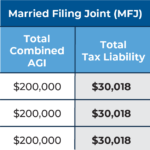One of the centerpieces of the $1.9 trillion American Rescue Plan Act recently signed by President Joe Biden was the establishment of a third round of coronavirus-related stimulus checks, officially a tax credit known as the 2021 'Recovery Rebates'. The maximum potential amount of an individual's 2021 Recovery Rebate is equal to $1,400 times the number of eligible individuals, which includes the taxpayer(s) themselves, as well as any dependents (not just limited to qualifying children) claimed by the taxpayer.
Those credits, however, phase out quickly over extremely narrow phaseout ranges. Yet, while the relatively modest income amounts at which a taxpayer’s 2021 Recovery Rebate credit is fully phased out will make it challenging for some individuals to qualify for the stimulus, the good news for many individuals is that there's the potential to receive the amount based on their 2019 income, their 2020 income, or their 2021 income.
More specifically, if, at the time the American Recovery Plan was enacted, the taxpayer’s AGI on file (generally 2019, but 2020 in the case of some early filers) was below the applicable phaseout range, taxpayers would generally have already received their 2021 Recovery Rebate. If the most recent year of AGI on file was 2019 (as was the case for the majority of taxpayers) and that AGI was too high to qualify for the taxpayer’s maximum potential 2021 Recovery Rebate, the American Recovery Act offers a second opportunity to receive a (larger) credit, based on the taxpayer's 2020 AGI, provided their 2020 tax return is filed before the Additional Payment Determination date. Barring any additional delays in the filing deadline for 2020 returns (beyond the current already-delayed filing deadline of May 17, 2021), the Additional Payment Determination Date is August 15, 2021.
Those who still haven’t received their full 2021 Recovery Rebate by the time they file their 2021 return will have one last chance to do so. To the extent that the AGI reported on the 2021 return is low enough to create a larger 2021 Recovery Rebate Credit than what the taxpayer has already received (based on their 2019 and/or 2020 AGI), the taxpayer will be 'trued up' via a credit on their 2021 income tax return.
Given the many ways in which a taxpayer can qualify to receive a 2021 Recovery Rebate credit, a non-trivial number of individuals can take action now, during 2021, that will enable them to receive a (larger) 2021 Recovery Rebate.
For many taxpayers, 2020 will perhaps represent the only year in which their income will be low enough to allow them to qualify for a 2021 Recovery Rebate Credit. In such circumstances, the Additional Payment Determination Date of August 16th really needs to be viewed as the taxpayer's de facto 2020 income tax return. For others, additional measures may be necessary to reduce their AGI enough to qualify for the maximum credit. Potential strategies that can be implemented now (in 2021) to reduce 2020 AGI include making deductible IRA contributions and/or HSA contributions, using installment sales to report eligible gains, maximizing the use of employer-sponsored retirement plans, and using accelerated depreciation options.
For those unable to use presently available strategies to reduce 2020 AGI enough to qualify for their maximum Recovery Rebate, 2021 provides increased flexibility and opportunity to drive down income. In addition to methods that can potentially reduce 2020 AGI, some taxpayers may also consider seeing if year-end bonuses can be paid in 2022 (utilizing the flexibility afforded to cash-basis businesses), reducing or eliminating planned Roth conversions, reducing portfolio income, or even taking a lengthy unpaid leave of absence/sabbatical from their employer!
Finally, married couples in separate property states can explore whether filing separate returns and ‘stuffing’ the lower-earning spouse’s income with all available dependents will allow that spouse to receive a big enough 2021 Recovery Rebate credit to more than offset any increase in income tax due to filing separate returns.
Ultimately, while not all taxpayers will be able to qualify for the maximum Recovery Rebate, many individuals whose incomes are closer to the 2021 Recovery Rebate Credit phaseout ranges have several sound planning strategies that can meaningfully increase the ultimate amount of 2021 Recovery Rebate Credit they receive, potentially relying not just on their income levels for the current year, but also on 2019 and 2020 income levels as well. Which also offers financial planners a range of strategies to help their clients maximize any Recovery Rebate credit due to them!





 Welcome back to the 226th episode of the Financial Advisor Success Podcast!
Welcome back to the 226th episode of the Financial Advisor Success Podcast!




